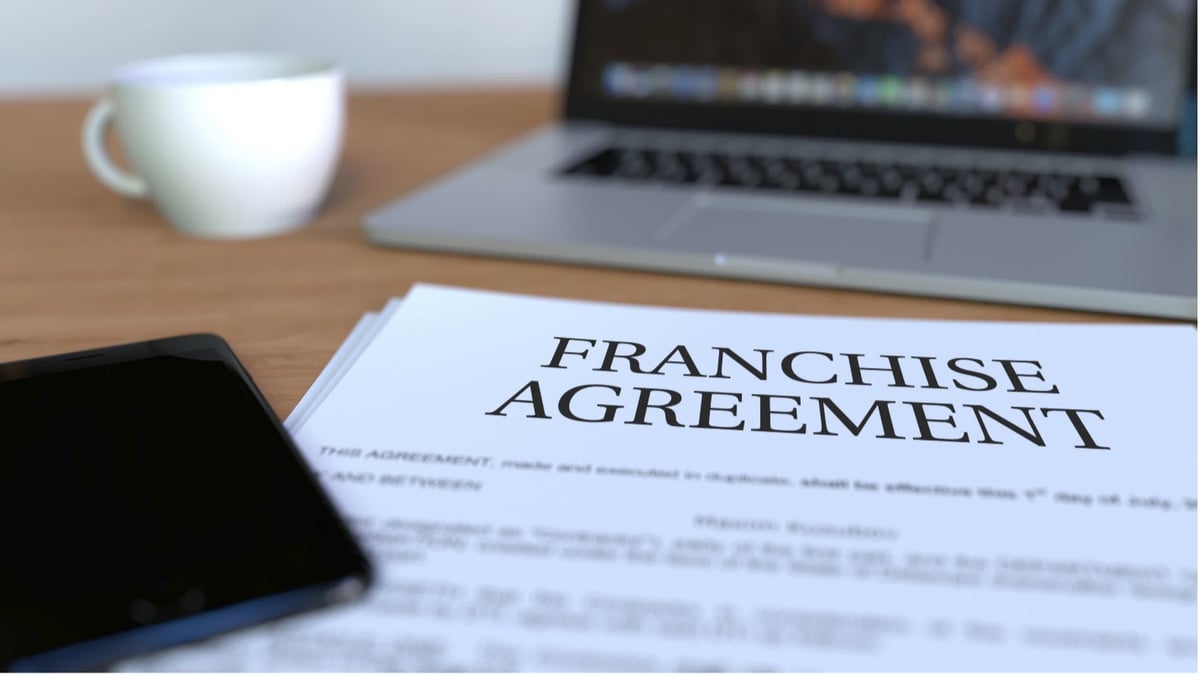The Basics
A franchise agreement is a clear legal document containing terms and provisions that are mutually agreed to by the franchisor and franchisee, binding them to meet certain obligations and expectations while under contract with each other. Ideally, franchise agreements lay out terms for everything from operational timelines to terms and conditions, to usage of branding to renumeration, territory rights, and more.
Some of the top clauses included in a typical franchise agreement are:
- Grant of franchise. This entails the exclusive rights to operate under a brand’s name, including access to operational modalities, use of trademarks and other proprietary information, business model, preferred vendor relationships, and the time period of your agreement.
- Standards on goods & services. The franchisee is tasked with providing products and services as defined by the brand’s expectations of quality. These standards may be supported by standardized operations manuals, approved suppliers, and brand-wide advertising campaigns.
- Initial and ongoing fees. During the terms of your agreement (typically 5-20 years, depending on the franchise), you will be expected to pay an initial franchise fee, cover other startup investments including working capital, ongoing royalty payments, and contribute advertising fees toward marketing, brand usage, etc. In return, your franchisor should provide a level of support and brand access that helps you run your business effectively and successfully.
All elements of the franchise agreement should be carefully considered, often with the assistance of a legal counselor or certified accountant familiar with the ins and outs of franchising. This agreement will set the tone for the relationship you share with your franchisor throughout your contracted partnership period, so the terms should be satisfactory for all parties involved.
Types of Franchise Agreements
Three of the main types are:
- Single-unit franchise. Under this type of agreement, the franchisee is granted rights to own and operate a single franchise unit with the same access to all the benefits of a brand that multi-unit owners will enjoy. As the simplest and most common type of franchise agreement, this is particularly appealing to first-time franchisees and those with limited business ownership experience.
- Multi-unit franchise. A multi-unit agreement enables franchisees to purchase and operate multiple locations within an agreed upon territory from the outset of their contract. A multi-unit franchisee may be required to adhere to an agreed upon schedule for developing a certain number of units within a specific time frame. If the franchisee fails to meet the deadlines, the franchisor may have the right to terminate a contract or pursue further development with other motivated parties.
Economies of scale can be found in inventory buying, marketing, advertising, staffing, and training and are more likely to work in your favor if you’re considering multiple-unit franchising. Given all the cost savings, and reduced expenses, multi-unit franchise ownership often means increased return on investment (ROI) and greater financial success with the backing of a proven brand.
- Area development agreement. Similar to a multi-unit agreement, an area development franchise agreement grants the franchisee rights to open and operate multiple units during a specified time period. The difference is that area development franchisees are granted exclusive development rights within a particular territory, precluding other operators to open units in that area during the contracted term.
- Master franchise agreement. Under this type of franchise agreement, the master franchisor grants to the master franchisee a specified area where the master franchisee has the right not only to open franchise units itself, but also to “sub-franchise” to third parties. Master franchisees are often referred to as sub-franchisors because of the additional responsibilities required to oversee their area and network. This is becoming an increasingly popular arrangement, particularly for investors who wish to grow internationally.
What to Expect from Your Franchisor, and What They Expect from You
Bear in mind that a franchise agreement is a contract between the franchisor and franchisee, with both parties responsible for holding up their end of the arrangement for the agreed upon length of the working relationship. The greatest advantage that franchisees receive through this type of business is a tried-and-true model for success which minimizes the risk often associated with independent or first-time business ownership. Whether you are an experienced business owner, or this is your first time out the gate, you should feel supported by the terms and conditions of your franchise agreement. What level of training and ongoing support will you require to feel like you’re making the best investment? Will the franchisor provide real estate assistance (including site selection and development)? Will their operations guidelines, marketing campaigns, and commitment to helping you succeed be consistent and cutting edge enough to allow you to thrive?
In terms of your end of the bargain, franchisees are required to uphold the brand’s company values, best practices, and provide the highest quality products and customer services that will make you and the rest of the franchise network proud to be a part of the family. In addition to your hard work, the ongoing royalty fees you will pay symbolize your commitment to the brand and grant you continuous access to many of the elements that have made the brand a success.
Get to Know Wayback Burgers
Wayback Burgers provides a winning franchise opportunity in the popular and recession-resistant fast-casual burger business market. Founded as a humble burger shack in Delaware in 1991 and growing steadily across the U.S. ever since, Wayback Burgers’ honest and uncomplicated approach to food and running a successful restaurant provides franchisees the opportunity to run their own business while being backed by the full support of one of America’s most popular better burger brands. With a proven track record, multi-pronged support system, and a focus on good, freshly prepared food to help feed and lift up our communities, Wayback Burgers is the perfect franchising opportunity for motivated entrepreneurs of all backgrounds.
To learn more about joining the Wayback Burgers family, get started today.

